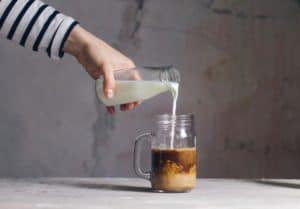
Many people enjoy their afternoon coffee. Many others enjoy their morning, afternoon, and evening coffees. An increase in the consumption of coffee has raised a lot of questions about the various health benefits and risks of consuming so much caffeine.
One of those questions is whether caffeine affects fertility.
In the article below, we will answer this question and share details on the answer that can help you make an informed decision about whether caffeine is right for you at this time in your life.
We will discuss male and female fertility, and whether caffeine can affect you trying to conceive.
Is Fertility Affected by Caffeine?
The quick answer to this is yes. Caffeine can affect fertility in certain circumstances. Be that as it may, many other issues can cause fertility problems, especially in women. Lowering your caffeine intake is usually one of the less invasive measures you can take to determine whether it is a contributing factor.
Some of these other issues may affect fertility:
- Ovulation disorders
- Cervical abnormalities
- Fallopian tube damage
- Endometriosis
- Ovarian insufficiency
- Low sperm production
- Abnormal sperm function or blockages
- Chronic illnesses
- Injury
- Lifestyle choices
As you can see, if drinking too much coffee is the issue, reducing the amount of caffeine you consume can quickly right itself whereas other issues are more difficult to pinpoint.

Does Caffeine Affect Female Fertility?
Female fertility can be affected by caffeine when they consume more than 200 mg per day. Several studies have shown that women trying to get pregnant who drink less than this amount have not been affected.
Another study has shown that caffeine can affect the maturing process in a fertile egg. This study is only in its preliminary research, and it has been conducted on female mice and monkeys only. The initial results point to caffeine being the cause, however.
It has also been suggested that high intakes of caffeine can increase the risk of miscarriage. This is likely due to pregnant women being more sensitive to stimulants including caffeine. Substances such as this are broken down slower during pregnancy, so it has more time to absorb into their system.
Male Fertility?
Caffeine can affect male fertility, as well. Research studies have shown that daily caffeine intake could potentially damage DNA through sperm which could affect male reproductive function. Keep in mind, that this research is in the early stages. It hasn’t been concluded to be inconsistent and inconclusive.
For the most part, men are not required to abstain from caffeine if a couple is trying to conceive nor is it typically a reason for infertility.

Can Caffeine Make You Infertile?
Beyond causing fertility issues, many people are concerned that caffeinated beverages can cause infertility in both men and women. As of now, there has been no consistent or concrete evidence to show that that is true.
Infertility issues are typically caused by either a physical or mental ailment that caffeine does not play a role. Studies have been done with intervals of low, medium, and high levels of caffeine consumption that have all had inconclusive evidence.
Does It Stop Ovulation?
The same study that measured the effects of caffeine on mice and monkeys also showed a possibility of caffeine affecting hormone levels during ovulation. Again, this research is very new, and the results are far from evidence that caffeine can stop ovulation or cause infertility in women.

How Much Coffee Can You Have When Trying To Conceive?
Most fertility experts and OB-GYN professionals agree that having limited quantities of caffeine while trying to conceive is perfectly fine for both males and females. As we mentioned above, there is very little evidence to support caffeine having any type of effect on fertility issues.
With that thought in mind, as long as the female is keeping her intake to below 200 mg of coffee per day. Going over that amount, however, can cause issues. Since it has been shown that caffeine can increase the risk of miscarriage, women who have reported drinking a moderate amount of caffeine are twice as likely to conceive.
Additionally, caffeine is not just limited to coffee in this instance. It also covers tea, chocolate, and any other beverage or recipe that would contain caffeine.
Do Energy Drinks Affect Pregnancy?
Drinks can very likely affect pregnancy as they are very high in caffeine levels. Pregnant women often abstain completely from caffeine, as again, it can increase the possibility of not carrying the pregnancy to full term.
As we mentioned above, pregnant women process things through their bodies more slowly than they normally would. As caffeine affects the nervous system, it can disrupt normal bodily functions that are important for pregnant women such as nervousness and their sleeping patterns.
While many practitioners believe that decaffeinated coffee once a day is perfectly fine for pregnant women, many still prefer to wait until after the baby is born. Energy drinks, on the other hand, are across the board not recommended.
Final Thoughts
It is possible that caffeine can affect fertility. Drinking coffee in moderation is unlikely to affect a man or woman’s ability to conceive. While pregnant, it is a better idea to stay awake from caffeinated beverages altogether. In this case, research has shown that moderate to high levels of caffeine while pregnant can lead to issues that can affect both mother and baby.
We hope this article has answered your questions on whether caffeine can affect fertility or not.
Featured Image Credit by: Maksim Goncharenok, Pexels














